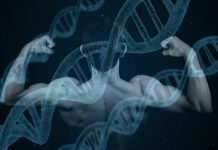Vitamins (from lat. vital amine, because the first discovered vitamin B1 is among the amines) are substances necessary for the proper functioning of the body. We take vitamins from the diet as the body is unable to synthesize them (with some exceptions). Vitamin deficiency (avitaminosis) causes various problems and diseases. Vitamins are not a source of energy and generally work as:
- catalysts for biochemical reactions
- involved in the metabolism of macronutrients (proteins, carbohydrates, fats)
- important for immune responses
- other (growth, nervous system activity, …)
Vitamins are divided into two groups:
- fat-soluble vitamins (accumulate in the body – a shortage can only come after a long time (weeks, months), but overdose is also possible) – A, D, E, K (sometimes F is also mentioned)
- water-soluble vitamins (excess is excreted by the body) – B vitamins (including G, H, M and PP), C, and sometimes P is also mentioned
In a varied diet, vitamins are found in sufficient quantities. In some cases (increased demand) it is advisable to focus on the food sources in question, or to receive them as a supplement, which is however often less effective. Vitamins C and E are also effective antioxidants.
Substances from which the body can synthesize corresponding vitamins are called provitamins.
Back: Nutrition















